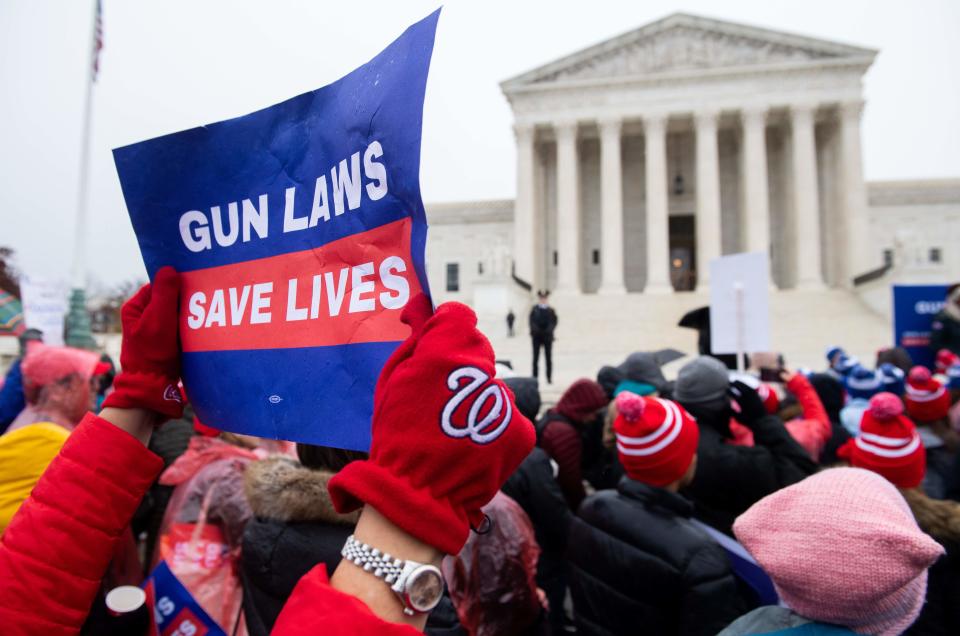Supreme Court should uphold laws keeping guns away from domestic violence abusers
We are heartened that the U.S. Supreme Court will weigh in on the controversial case, U.S. v Rahimi, because it could make the lives of those who live under the terror of domestic violence so much safer.
In February of this year, the U.S. Fifth Circuit Court of Appeals wrote that Zackey Rahimi is “hardly a model citizen.”
The Texas man is a convicted drug dealer with a history of armed violence. His girlfriend filed a restraining order that required him to relinquish his guns.
However, the judges ruled unanimously that Rahimi should be allowed to get his guns back. With this decision, the Fifth Circuit struck down a lifesaving federal statute prohibiting firearms possession by individuals who a court has determined pose a credible threat to the safety of an intimate partner or child.
That decision stunned those of us who have long worked to protect domestic violence victims.
Another view: Here's how Nashville can move toward a victim-centered justice system
Many domestic violence survivors have been threatened with firearms
Nearly all of the women and children who come to YWCA Nashville & Middle Tennessee’s Weaver Domestic Violence Center have experienced trauma from an abuser with a weapon. The survivors share with us how their abusers tried to keep control by pointing a gun at them, holding the weapon against their bodies, and even turning the gun on themselves, threatening suicide if their victim tries to leave.

Often, children as young as 3 or 4 try to intervene and protect their moms, only to have the gun pointed at them. They come to our shelter carrying emotional scars and nightmares.
In Knoxville, our community is reeling from the recent murder of Knox County Sheriff’s Deputy Tucker Blakely who was responding to a domestic disturbance call.
YWCA Knoxville and Tennessee Valley advocates are available to assist victims with filing orders of protection to provide legally binding safety from abusers. Those found guilty of abuse are required to dispossess any firearms they own, but there is no follow-up to know if the firearms have been relinquished.
Our organization is leading a collaborative effort for firearm dispossession through the Office on Violence Against Women on a local platform. On average, 70 women in the U.S. are shot and killed by an intimate partner each month, and the presence of a gun in a domestic violence situation makes it five times as likely a woman will be killed.
The Second Amendment is not a suicide pact
We think that allowing abusers to have access to firearms was clearly wrong because the Fifth Circuit did not follow the instructions of an earlier Supreme Court ruling. In the earlier case, New York State Rifle & Pistol Association v. Bruen, the Supreme Court ruled that the government must find historical analogues to serve as examples in creating gun regulations.
The Fifth Circuit struck down the federal law that prohibits abusers from possessing firearms, writing that it could not find an exact historical replica for such a law. We believe that the Fifth Circuit’s misinterpretation of Bruen poses a real threat to real victims, many of whom are women and children. Bruen doesn’t require an exact historical replica, only historical analogues of which plenty of well-grounded examples of gun regulations exist.
The Second Amendment is not unlimited. As the state of California has argued in a Rahimi amicus brief, nor is the Second Amendment a “suicide pact.”
While it protects the right of law-abiding citizens to use arms for self-defense, it does not prevent the government from enacting various gun regulations that have a longstanding historical tradition.
This includes restrictions on gun possession by individuals deemed a credible threat to the safety of an intimate partner or child.
Keeping guns away from abusers protects women
These laws work, and we need to keep them on the books:

Over half of all intimate partner homicides are committed with guns, and women are five times more likely to be murdered when their abuser has access to a firearm. Laws that reduce abusers’ access to firearms are associated with reductions in intimate partner homicide.
Abusers use guns to threaten and control their victims, and threats often escalate to lethal violence. Firearms are the most commonly used weapon in all homicides, including intimate partner homicide. Prohibiting firearm access for those with a history of domestic violence has proved effective in reducing rates of intimate partner homicide.
Women are disproportionately affected by domestic violence and are more likely to be killed by an intimate partner than men. Keeping guns out of the hands of abusers is associated with lower rates of violence against women and intimate partner homicides.

The Rahimi case, which will be argued on Nov. 7, offers the Supreme Court the opportunity to clarify and strengthen its earlier guidance in Bruen and to reaffirm the need for laws that help keep guns out of the hands of abusers, laws that have long proven to be effective – and consistent with the Second Amendment. We’re confident victims lives will be saved by keeping firearms out of the hands of domestic abusers.
Sharon K. Roberson, Esq, is president and CEO of the YWCA Nashville & Middle Tennessee. Stephanie Burrage is chief executive officer of the YWCA Knoxville & the Tennessee Valley.
This article originally appeared on Nashville Tennessean: Supreme Court case: Domestic violence abusers should not have guns

